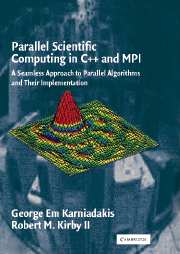 Parallel Scientific Computing in C++ and MPI
Parallel Scientific Computing in C++ and MPI Published online by Cambridge University Press: 05 October 2013
Scientific Computing is by its very nature a practical subject – it requires tools and a lot of practice. To solve realistic problems we need not only fast algorithms but also a combination of good tools and fast computers. This is the subject of the current book, which emphasizes equally all three: algorithms, tools, and computers. Oftentimes such concepts and tools are taught serially across different courses and different textbooks, and hence the interconnections among them are not immediately apparent. We believe that such a close integration is important from the outset.
The book starts with a heavy dosage of C++ and basic mathematical and computational concepts, and it ends emphasizing advanced parallel algorithms that are used in modern simulations. We have tried to make this book fun to read, to somewhat demystify the subject, and thus the style is sometimes informal and personal. It may seem that this happens at the expense of rigor, and indeed we have tried to limit notation and the proving of theorems. Instead, we emphasize concepts and useful “tricks of the trade” with many code segments, remarks, reminders, and warnings throughout the book.
The material of this book has been taught at different times to students in engineering, physics, computer science, and applied mathematics at Princeton University, Brown University, and MIT over the past fifteen years. Different segments have been taught to undergraduates and graduates, and to novices as well as to experts. To this end, on all three subjects covered, we start with simple introductory concepts and proceed to more advanced topics; such bandwidth, we believe, is one strength of this book.
To save this book to your Kindle, first ensure [email protected] is added to your Approved Personal Document E-mail List under your Personal Document Settings on the Manage Your Content and Devices page of your Amazon account. Then enter the ‘name’ part of your Kindle email address below. Find out more about saving to your Kindle.
Note you can select to save to either the @free.kindle.com or @kindle.com variations. ‘@free.kindle.com’ emails are free but can only be saved to your device when it is connected to wi-fi. ‘@kindle.com’ emails can be delivered even when you are not connected to wi-fi, but note that service fees apply.
Find out more about the Kindle Personal Document Service.
To save content items to your account, please confirm that you agree to abide by our usage policies. If this is the first time you use this feature, you will be asked to authorise Cambridge Core to connect with your account. Find out more about saving content to Dropbox.
To save content items to your account, please confirm that you agree to abide by our usage policies. If this is the first time you use this feature, you will be asked to authorise Cambridge Core to connect with your account. Find out more about saving content to Google Drive.